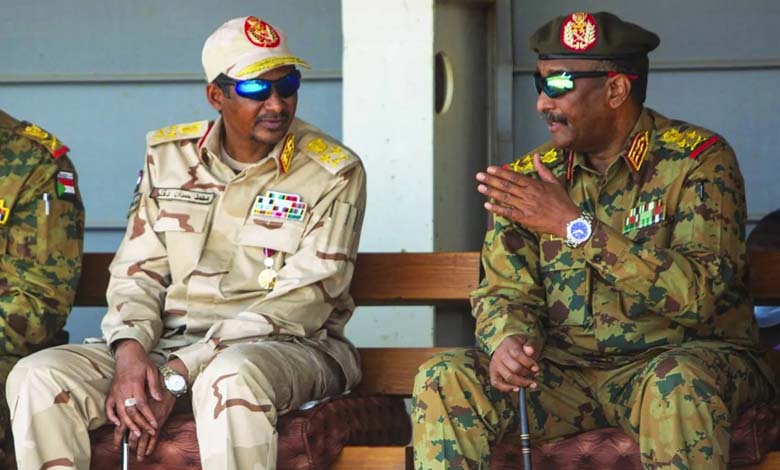The Two-Government Scenario Raises Fears of Sudan’s Partition

From Port Sudan in the east to Nyala in the west, a frantic race is unfolding between Sudan’s warring parties to establish a government with perceived legitimacy before the war ends.
-
Sudan Shaken by Retirees’ “No”: A Voice from the Army Rises Against War and Chemical Weapons
-
Angry March in London Denounces Use of Chemical Weapons in Sudan
While the Sudanese army and its allies are working to form a new government in Port Sudan, led by newly appointed Prime Minister Kamil Idris, the city of Nyala in South Darfur saw the official announcement last week of the leadership of the Sudan Foundation Alliance (called “Tassis”), chaired by Rapid Support Forces (RSF) commander Mohamed Hamdan Dagalo.
“Tassis” is the coalition tasked with forming a parallel government to that in Port Sudan.
As the armed conflict continues in many regions despite calls for peace, fears grow that Sudan could be divided.
-
Sudan: Reliable Evidence Unveiled of Chemical Weapons Used to Kill and Maim Hundreds of Civilians Including Children in Darfur
-
The Role of Islamist Militias in the Sudan Conflict Worries Arab States Opposed to the Muslim Brotherhood
A Government in Port Sudan
In May, Sudanese Army Commander and Transitional Sovereignty Council President Abdel Fattah al-Burhan appointed Kamil Idris as Prime Minister of the prospective civilian government in Port Sudan.
Idris is the first to hold the position since Abdalla Hamdok’s resignation in January 2022, following political deadlock after the military dismissed the civilian government on October 25, 2021.
Idris’s appointment comes amid severe political and security turmoil caused by the war that began in April 2023 between the Sudanese Armed Forces and the RSF, which created a power vacuum and displaced over 13 million people, 4 million of whom fled to neighboring countries.
-
Chemical Weapons in Sudan: A Military Crime in Global Silence
-
Investigative Report: Is the Sudanese Army Leading a Silent Campaign of Ethnic Cleansing in the West?
The Democratic Civil Coalition of the Sudanese Revolution Forces, known as “Samoud,” rejected Idris’s appointment, calling it “constitutionally baseless” and a “desperate attempt by the army to gain legitimacy and international recognition before the war concludes.”
Samoud’s Secretary-General, Siddiq al-Mahdi, said that the priority should be ending the war, not appointing officials, and that “this step lacks any constitutional legitimacy and is only meant to legitimize an illegitimate situation.”
Despite internal opposition, the army pressed ahead with the formation of a civilian government. Kamil Idris has named five ministers so far, but disagreements with signatories of the Juba Peace Agreement—particularly the Justice and Equality Movement led by Jibril Ibrahim and the Sudan Liberation Army led by Minni Minnawi—have hindered further appointments.
-
The Sudanese Army Under Scrutiny: Systematic Violations Against Civilians and Suspicions of Chemical Weapons Use
-
Political Blackmail and Islamist Dominance over the Sudanese Army: No to War, Yes to Revolution
A Parallel Government in Nyala
In February, several Sudanese military and political factions announced in Nairobi the formation of the Sudan Foundation Alliance “Tassis”.
This alliance includes the RSF, the SPLM-N led by Abdelaziz al-Hilu, various Darfur armed groups, the National Umma Party leader Fadlallah Barma Nasir, and a representative of the Democratic Unionist Party, Ibrahim al-Mirghani.
In February and March, the alliance adopted its founding documents, including a political charter and a transitional constitution, affirming the principle of a secular state.
-
The Muslim Brotherhood Backs Al-Burhan: Fueling War and State Collapse in Sudan
-
From Al-Bashir to Al-Burhan: The Muslim Brotherhood Continues to Wreck Sudan
“Tassis” is close to announcing its own “peace government” to rival the Port Sudan administration.
Last week, the alliance designated its leadership: Mohamed Hamdan Dagalo as president, Abdelaziz al-Hilu as deputy, Dr. Alaa Naqd as spokesperson, and Makin Tirab as secretary.
Observers warn that the formation of a parallel government will deepen divisions between the factions and may lead to the effective partition of Sudan into two states.
-
Precision Airstrikes Kill Dozens of Military Experts in Port Sudan
-
The Islamic Movement’s Retreat and al-Burhan’s Silence: Questions Surround the Political and Military Cover Behind the Strategic Strikes in Port Sudan
The “Samoud” coalition urged “Tassis” to reconsider, calling instead for both sides to enter negotiations to end the war, followed by a political process resulting in a unified, civilian-led government reflecting Sudanese aspirations for democratic transition.
The Threat of Partition
Sudanese military expert and retired colonel Walid Ezzeldin, a member of the central command of the “Tadamon” veterans’ organization, warned that both sides rushing to form governments in their controlled areas “will complicate the situation and increase calls for self-determination, making partition into two separate states a real possibility.”
-
Sudanese Political Analyst: Port Sudan Attacks Signal a Dangerous Strategic Shift in the Course of the War
-
Targeted Strikes in Port Sudan Reveal Tactical Shift by Rapid Support Forces
Ezzeldin said that with international efforts leaning toward a negotiated settlement, both sides are likely to push for their allies’ inclusion in talks, potentially raising demands for autonomy—particularly from the western regions controlled by the RSF and its allies.
He also noted that the RSF is nearing full control of El Fasher (North Darfur) and is cooperating with the SPLM-N to assert control over Kordofan in western Sudan.
He added that the RSF’s recent takeover of the strategic triangle between Sudan, Egypt, and Libya makes the scenario of partition more likely, especially as Sudan’s army leadership continues to align with the Brotherhood’s agenda—an agenda unconcerned with preserving Sudan’s unity as long as it retains power.
-
Precision Strikes Shake Islamist Camps in Port Sudan: Mass Escape and Suspicious Silence from al-Burhan
-
Precision Strikes Expose Shadow Alliances: Foreign Experts Killed and Islamists Unveiled in Port Sudan












